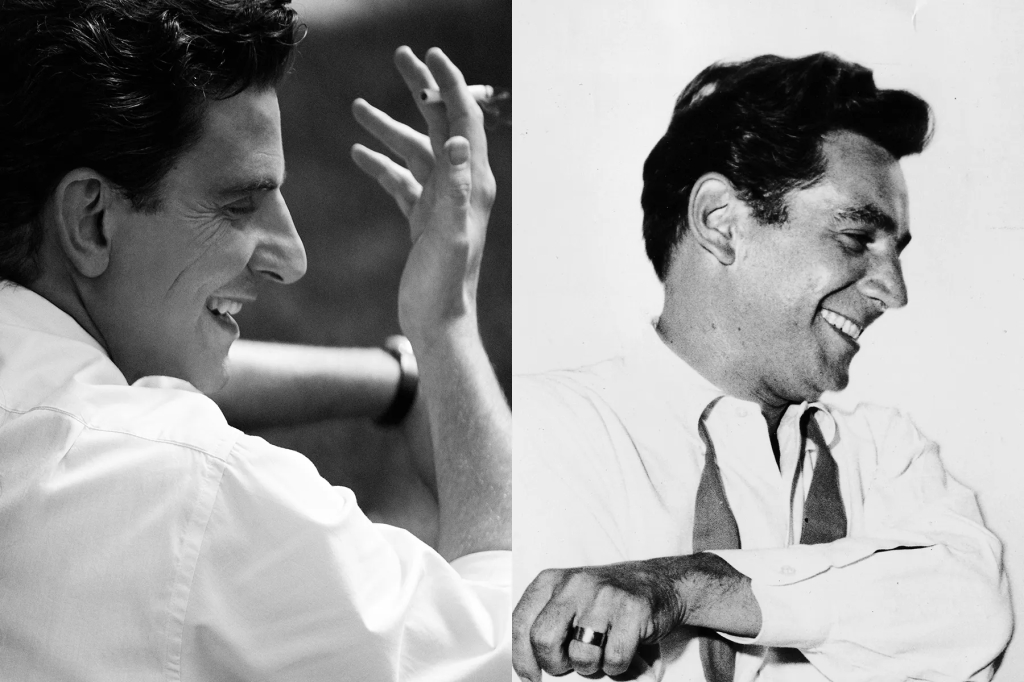Composer, Broadway icon, America’s Conductor, champion of orchestral music, New York landmark, poster boy for Tom Wolfe’s “Radical Chic,”Leonard Bernstein WAS classical music in America for much of his celebrated tenure at the New York Philharmonic.
He was the first famous American conductor on the world stage, a regular feature on America TV in the decades before cable, streaming and everything else that atomized the great American “audience” into a million cultural, musical and entertainment niches. And he was immortalized by his thrilling music to “West Side Story.”
He was famously playful, but exacting and deadly serious about the score. Note the “take number” on that recording session.
As I prep for the task of judging Bradley Cooper’s “Maestro,” I thought I’d share some of the background material and video this holiday release film experience prompts me to revisit.
The movie hits theaters and then Netflix at the end of the year, so you’ve got time to do a little prep. There are legions of Lenny biographies and books by Bernstein on Amazon. I recall reading “Dinner with Lenny” and Joan Peyser’s biography of him some while back, fine overviews of a Life Lived Large.
Like a lot of kids growing up in the America far away from the big cities of the ’60s and early ’70s, some of my first exposures to culture were in the dashing, witty, effervescent and effortlessly cool Leonard Bernstein’s “Young People’s Concerts” on weekend network TV.
Bernstein was a great communicator and had a way of making The Great Music understandable and palatable to the young. He was always dressed in a suit or a tuxedo, spoke like a teacher confident that his students would “get it,” and made Great Art, Great Music and his Great City’s Lincoln Center aspirational — a secret code you wanted to master, a nirvana you want to visit or live in.
I hadn’t realized he’d been doing this for over a decade before I was one of the “young people” who caught my first telecast. The concerts themselves continue, even though they don’t have the star conductor/network TV deals they once.
Bernstein’s shows are archived on YouTube, a public service tucked into a sea of cat and cocker spaniel videos.
This is one I seem to remember. The Musical Mister Rogers was talking up the music of “2001: A Space Odyssey.”
The title card/logo of this long-running series gives us an idea that maybe the people raising hell about Cooper’s fake nose in the title role of his movie have a point. Bernstein had a large but not oversized schnozz, and Cooper’s prosthetic seems to come to a more pronouned point in the beak. At least from some angles. But not all.

In college I picked up on something it took a Dick Cavett autobiography which I read to point out to me. The Midwesterner Cavett, who’d later use music from Bernstein’s “Candide” as his chat show theme music, aspired to the high culture and sophistication Bernstein was advertising in his every public appearance. New York could seem like the center of the universe, luring people with a show business Jones like Cavett. I got that. But the city’s brand-in-full was as a place of great museums, great art, great shows and the greatest highbrow music the arts had to offer, something Bernstein became the public face of.
Unconciously, I absorbed that, too. I never particularly wanted to live in New York, but great music is everywhere and at least in the way Bernstein pitched it, merely seeking it out and learning an appreciation of it was an aspiration worth reaching for as well.
No, you don’t have to be a conductor or classical musician or even live in a city where great museums and great orchestras reside. But somewhere between “acquainted” with that world and well-versed in it was something one could read, listen and travel towards.
You could barely pick up a public radio signal where I grew up, but that’s what I went to high school workshops to learn about and what I went to college to pursue as a career. While learning how to pronounce Mahler’s “Das Lied von der Erde” and tortorous names like that of conductor Gennady Rozhdestvensky, I’d go hear the Moscow Philharmonic, the Vienna Chamber Orchestra, the Cleveland Orchestra, the Philadelphia Orchestra and continue doing that in public radio cities where I worked after graduation.
That’s all because of Leonard Bernstein.
As I changed careers and moved into print criticism, I reviewed classical music concerts and interviewed figures from that world — pianists, conductors, flutists and Pavorotti. The first time I went to New York was to cover the New York Film Festival, previewing films at that very same Lincoln Center which was home to the New York Phil. On a long lunch break between films, I took a pilgrimage tour of Carnegie Hall.
All, consciously or subconsciously, because of Lenny.
Bernstein’s sexually diverse personal life was complicated in ways our more accepting and understanding time can barely fathom, and that appears to be the a larger interest of Cooper’s film. I get a little “De-Lovely” vibe from the trailers, remembering that Kevin Kline/Ashley Judd Cole Porter biopic of twenty or so years back, a closeted gay man and the understanding and supportive wife.
But futile hope or not, I hope Philly suburban Cooper “gets” this other aspect of Bernstein, what he represented, striving for a place in a world he didn’t grow up in, aspirations he recognized as his duty to pass on to new generations via humanizing and lionizing “highbrow” music. This Massachusetts-born son of Ukranian-Jewish immigrants looked at high culture the same aspirational way in his youth, an icon who took his stewardship and status as ambassador of “that world” to those who weren’t born into as seriously as he took everything else
